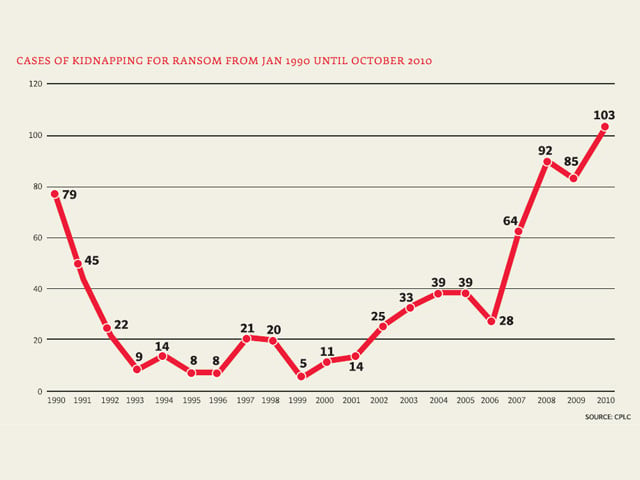Kidnapping for ransom cases hit 20-year high
Kidnapping for ransom cases in a year in Karachi exceed the 100 mark, police say 18 have been solved.

According to police records and data of the Citizen Police Liaison Committee (CPLC), 103 cases of kidnapping for ransom were reported in the Sindh metropolis since January this year, of which only 18 have so far been solved.
The month-wise breakdown of the reported cases in 2010 is: 14 in January, February, 4, March, 7, April, 9, May, 7, June, 14, July, 10, August, 16, September, 10 and October 12.
The total number of reported kidnapping for ransom cases over the last 20 years are 763, of which around 390, or 52 per cent, have been solved by the authorities. About 209 gangs involved in kidnappings have been busted, including 18 in 2010. Till now, more than 354, or 48 per cent, cases remain unsolved.
Kidnapping trend
Criminologist Dr Fateh Muhammad Burfat, who is a professor at the University of Karachi’s sociology department and a member American Society of Criminology, warns that until the flow of illegal weapons is not stopped, kidnapping for ransom cases will not end.
Burfat says one needs to go back even before the era of ’90s to understand why kidnapping cases have increased manifolds.
“In my opinion, the huge of influx of arms and drugs in our society since the Zia years in the 80s is to be blamed for the rise in crimes such as kidnapping for ransom cases.”
According to Burfat, the Kalashnikov and heroin culture of the 80s has added extraordinary firepower to the ‘dakaits’ all over the country and the situation was now out of control. Initially, when kidnapping for ransom cases began in the 80s, the business class and specifically Hindu traders in Sindh were targeted. Prior to this, only a few feudal lords used to patronise such outlaws.
But over the years, he said, the problem has become more complex. “Today, kidnapping for ransom is a lucrative business and every influential group, including ethnic, religious and political factions back such criminal networks in one way or the other.”
He said the trend of the past two decades also shows that once a military dictator takes over, there is a brief lull in such cases. In 1999, when Gen Musharraf illegally dislodged the government of an elected prime minister, Nawaz Sharif, only five kidnapping for ransom cases were reported out of which four were solved within the same year. However, by the time Musharraf stepped down as president in 2008, such cases had skyrocketed to 92.
“This is because of the fact that whenever a dictator steps in, there’s an initial fear of the martial law like situation, especially since false promises are made by such leaders that law and order would be maintained at all costs.”
Cause of alarm?
However, law-enforcement agencies claim that the situation was well under control and there was nothing to worry about. Anti Violence Crime Cell’s (AVCC) newly-appointed chief SSP Farooq Awan said: “Kidnapping cases have increased this year but we recently apprehended some high-profile criminals and now you will witness a sharp drop in such cases.”
CPLC chief Ahmed Chinoy, whose unit works in close coordination with the AVCC, backed the claim. “Sixteen major gangs have been busted over the past five or six months and one can (safely) say that the occurrence of such cases will decrease from now onwards.”
Some of the gangs which were involved in kidnapping for ransom in Karachi, included Imdad Jabran, who took victims to remote rural areas in Sindh after abducting them from the city. Rana Chanoudah, whose hideout was in Balochistan, and Imran Baloch whose criminal network operated within Karachi’s no-go areas.
Chinoy said that although in majority of the cases criminal gangs were involved, there were occasions when groups backed by the militant groups based in Waziristan have also been involved in kidnapping for ransom.
The Sindh Police’s Crime Investigation Department officials agree with the assertion, saying that one of the avenues of revenue generation for militant groups is kidnapping.
However, Awan disputes the claim and said there might be one or two such cases in the past. “Ask the CID to give you a list of cases in which militant groups are involved in kidnapping cases in Karachi this year,” he said, adding that such groups have other more lucrative sources of income.”
Published in The Express Tribune, November 4th, 2010.



















COMMENTS
Comments are moderated and generally will be posted if they are on-topic and not abusive.
For more information, please see our Comments FAQ